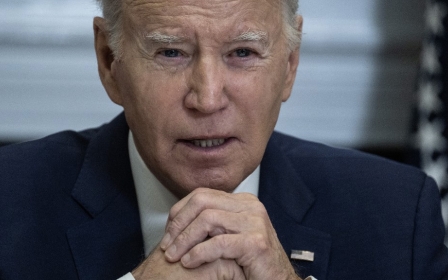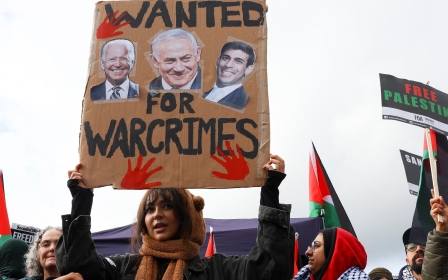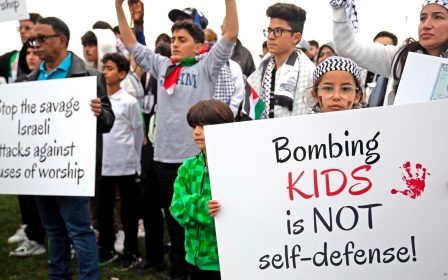Israel-Palestine war: How Gaza changed global politics

Antonio Guterres, secretary general of the United Nations, is an unlikely revolutionary.
But the 73-year-old former Portuguese prime minister is on a mission to achieve the sort of change that Che Guevara only dreamt of: overturning the US-led world order.
Guterres did not mention US President Joe Biden by name in his electrifying opening speech at the Doha Forum last weekend. But he did not need to as he expressed his revulsion at the consequences of the US decision to veto last week’s ceasefire resolution.
"I urged the Security Council to press to avert a humanitarian catastrophe and I reiterated my appeal for a humanitarian ceasefire to be declared." Translation: "If a genocide occurs in Gaza it’s on you, Joe Biden."
Some are starting to call the US president "Genocide Joe".
With at least 18,400 Palestinians already dead - more than twice the number who died in Srebrenica 28 years ago - this is not idle talk.
Follow Middle East Eye's live coverage for the latest on the Israel-Palestine war
I am not a lawyer, but in October 800 experts in international law and conflict studies signed a public statement warning of the possibility of genocide being perpetrated by Israeli forces against Palestinians in the Gaza Strip.
They provided powerful evidence of the scale and virulence of Israeli attacks while adding that "language used by Israeli political and military figures appears to reproduce rhetoric and tropes associated with genocide and incitement to genocide."
The situation has gotten even worse since.
Aiding and abetting genocide
If an international court confirms that provisional judgement, then President Biden will be found guilty of aiding and abetting a genocide, an infinitely more terrible crime than anything that has been levelled at Donald Trump.
No wonder Biden’s nerve cracked this week. He issued a belated warning to Israeli Prime Minister Benjamin Netanyahu that Israel was losing support over what he very belatedly called Israel’s "indiscriminate" bombing in Gaza.
Everybody I spoke to in Doha agreed that the Americans can no longer be trusted to take the mediating role in handling peace talks
Indiscriminate bombing is a war crime. One which has been carried out with wholehearted US support - and a constantly replenished supply of US munitions. It was impossible to miss the sense of disgust bordering on hostility towards the United States at the Doha Forum.
Even the foreign minister of normally loyal Jordan, Ayman Safadi, remarked that he was "extremely disappointed" by the US veto. He complained that Israel "feels it can get away with murder. One country is defying the whole world, and the whole world is unable to do anything about it".
It’s the US which has given Israel the impunity Safadi talked of.
Everybody I spoke to in Doha agreed that the Americans can no longer be trusted to take the mediating role in handling peace talks, though there was no agreement of what or who would replace the US.
But China is starting to play its hand. At one panel discussion Dr Huiyao Wang, former counsellor to the State Council of the People's Republic, pressed the case for a peacekeeping force of the UN in Gaza.
A multipolar world
The buzzword at Doha was "multipolar" - a polite way of saying that the age of US dominance is over.
This must have been music to the ears of Russia and Iran - both countries represented in online interventions by foreign ministers Sergey Lavrov and Hossein Amir-Abdollahian.
For Lavrov, Gaza is a gift, rescuing Russia from opprobrium over Ukraine in the same way that the British-French-Israeli invasion rescued Russia from global ignominy over Hungary in 1956.
Gaza has changed global politics.
It was impossible to miss the sense of disgust bordering on hostility towards the United States at the Doha Forum
The failure of the international community to intervene in Gaza dominated the debate in Doha, and was acutely analysed by Guterres when he suggested that the failure to respond to the terrible events in Gaza has collapsed the supposedly liberal world order set up by the United States after Second World War.
He called for urgent reform to the post-war security structures, noting that these structures are "weak and outdated, caught in a time warp reflecting a reality of 80 years ago".
He added - for good measure - that the Security Council is "paralysed by geo-strategic divisions".
In an astonishing twist of history, it is the self-styled liberal democracies - United States, European Union and Britain - which discredited the liberal world order by giving carte blanche to Netanyahu.
The courage, suffering and endurance of the Palestinian people have changed world history, and with the US in disgrace, the UN secretary general has become their most eloquent voice on the international stage.
The views expressed in this article belong to the author and do not necessarily reflect the editorial policy of Middle East Eye.
Middle East Eye propose une couverture et une analyse indépendantes et incomparables du Moyen-Orient, de l’Afrique du Nord et d’autres régions du monde. Pour en savoir plus sur la reprise de ce contenu et les frais qui s’appliquent, veuillez remplir ce formulaire [en anglais]. Pour en savoir plus sur MEE, cliquez ici [en anglais].





